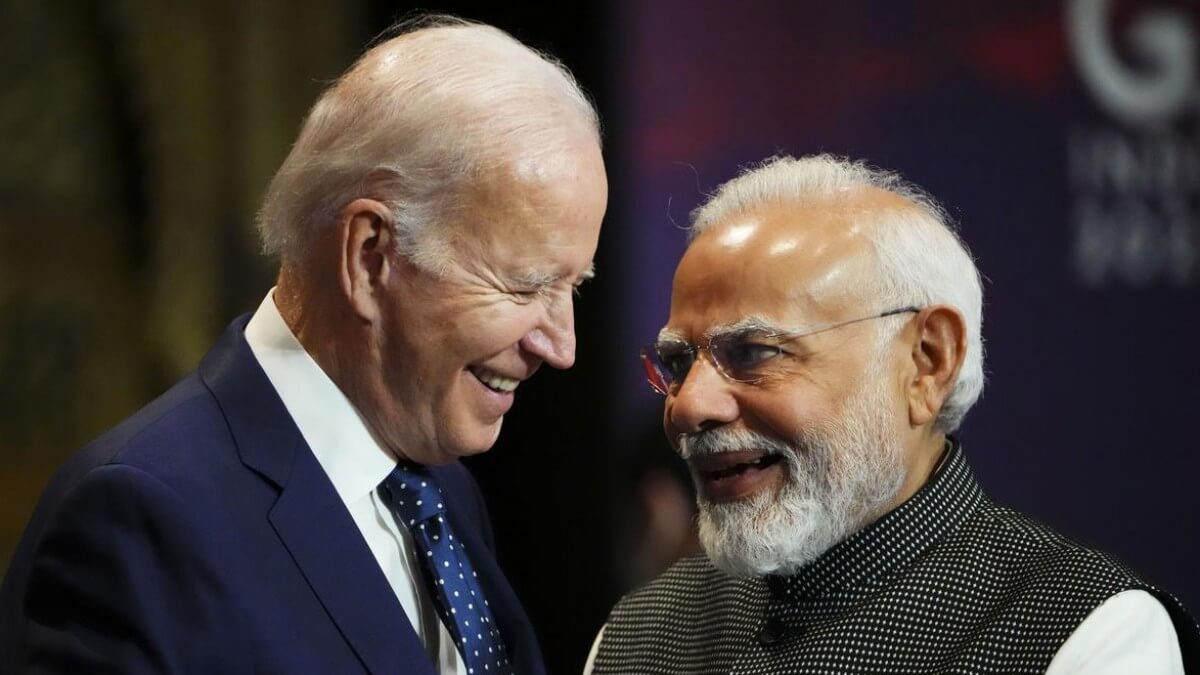On Tuesday, more than 70 Democrats from both the House and Senate asked US President Joe Biden to make human rights an immediate focus in his meeting with Indian PM Narendra Modi this week.
In an open letter, they encouraged Biden to discuss “areas of concern” directly with Modi, referring to his administration’s position on human rights, press freedom, and religious freedom.
Overview
The US lawmakers expressed concern about religious intolerance, press freedom, internet access, and the targeting of civil society organisations.
The lawmakers wrote, citing a number of US state department reports and statistics like rankings for press and religious freedoms, “A series of independent, credible reports reflect troubling signs in India toward the shrinking of political space, the rise of religious intolerance, the targeting of civil society organisations and journalists, and growing restrictions on press freedoms and internet access.”
Senator Chris Van Hollen and Representative Pramila Jayapal led the initiative and emphasised that while “we do not endorse any particular Indian leader or political party — that is the decision of the people of India — we do stand in support of the important principles that should be a core part of American foreign policy.”
Today, @SenVanHollen & I are leading over 70 of our colleagues in calling on @POTUS to address India’s human rights record with PM Modi. We must ensure freedom of the press, religious tolerance, internet access, & the diversity of political thought. https://t.co/ezUxX4aaYK
— Rep. Pramila Jayapal (@RepJayapal) June 20, 2023
The letter stated, “we ask that, during your [Biden’s] meeting with Prime Minister Modi, you discuss the full range of issues important to a successful, strong, and long-term relationship between our two great countries.”
The signatories advised Biden that he had made “respect for human rights, press freedom, religious freedom, and pluralism core tenets of American foreign policy,” and accordingly, these must be applied to “friend and foe alike.”
They expressed that both the US and India had established free speech, press freedom, and religious freedom in their respective constitutions, and that they shared a particular relationship through moral leaders like Mahatma Gandhi and Martin Luther King Jr.
Speaking to reporters before Modi arrived in Washington, US National Security Council spokesperson John Kirby declined to comment on whether Biden would discuss these issues. Still, he expressed that it is “commonplace” for Biden to raise concerns about human rights.
Prime Minister Modi’s government has repressed religious minorities, emboldened violent Hindu nationalist groups, and targeted journalists/human rights advocates with impunity.
— Ilhan Omar (@IlhanMN) June 20, 2023
I will NOT be attending Modi’s speech.
Democrats Welcome Close US-India Security, Trade Ties
Nonetheless, the US lawmakers included positive aspects of the bilateral relationship in the letter, acknowledging India as a “crucial partner for stability” in the Indo-Pacific, an important member of the Quadrilateral Security Dialogue (the ‘Quad’), expressing support for bilateral industrial and military cooperation, hailing economic relations, and praising the diaspora.
Democrats welcomed PM Modi on his visit to Washington and stated that “We want a close and warm relationship between the people of the United States and the people of India. We want that friendship to be built not only on our many shared interests but also on shared values.”
The letter indicated that the lawmakers “support the trip Defense Secretary Lloyd Austin took to New Delhi earlier this month to finalise a “Roadmap for U.S.-India Defense Industrial Cooperation,” as it would deepen the countries’ strategic partnership.
The US lawmakers believe that trade and investment between the US and India are increasing, and there is a chance to enhance economic ties further. “We welcome India’s potential increased role in supporting secure supply chains for critical sectors such as semiconductors and pharmaceuticals,” they said.
US report identifies widespread rights violations in India
— News All Today (@NewsAllToday) April 18, 2022
The latest US State Department report on human rights has highlighted major violations in India, including extrajudicial killings by government agents, violence against Muslims and killings by government and non-gov… pic.twitter.com/rRo1Df3LrV
US Condemns Human Rights Issues in India
Earlier this year, an independent US Commission report urged the US State Department to classify India as a country of special concern for violations of religious freedom for the fourth year in a row. The report was rejected by the Indian government as “biased.”
In 2022, the US released its annual report on global human rights practices. In its comprehensive report on India, the Department expressed concern over arbitrary arrests, extrajudicial executions, restrictive legislation on non-governmental organisations, restrictions on freedom of speech, violence against religious minorities, and other similar actions.
The report also accused the Indian police of neglecting to file arrest records for detained individuals in some instances, resulting in “unresolved disappearances.”
It also refers to the 2021 World Press Freedom Index study, which categorises India as “dangerous for journalists,” citing atrocities done against media personnel by police, political organisations, and criminals.
Modi’s US Visit
On Thursday, Modi will address a joint session of the House and Senate, one of Washington’s greatest honours bestowed upon foreign leaders.
During Modi’s meeting with Biden, the two will likely discuss the “co-production of munities and ground vehicles, such as armoured personnel carriers.”
Modi and Biden will address strategies to broaden and consolidate the Quad engagement and the growing importance of the two nations’ strategic cooperation. The discussions will focus on strengthening the two nations’ strategic technology partnerships in defence, energy, clean energy, and space.

